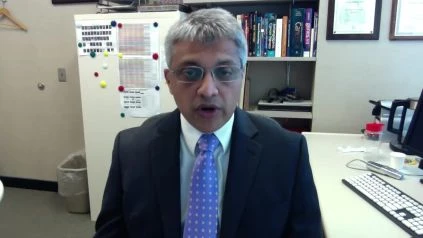Shaji Kumar, MD of Mayo Clinic explains how patient volumes associated with longer survival in MM will affect clinicians and treatment.
______
New research in the September 2019 issue of JNCCN—Journal of the National Comprehensive Cancer Network finds that providers with more experience treating people with multiple myeloma have better outcomes than those with more limited experience. In general, providers who saw the most cases were more likely to be located at academic, NCI-designated cancer centers. However, the researchers found that the very highest-volume providers at community facilities did achieve equally low mortality rates as clinicians at NCI-designated cancer centers.
“Multiple myeloma care is complicated and nuanced, with many specific treatments and management scenarios,†said senior researcher William A. Wood, MD, MPH, UNC Lineberger Comprehensive Cancer Center. “Our results show that provider experience, and potentially access to resources at a comprehensive cancer center, may improve survival in patients with multiple myeloma. The reasons might have to do with familiarity with the benefits and best use of newer drugs and regimens, access to resources to help with management of toxicities or complications, or other factors. Or, it might be that patients who are seen by higher volume providers are more likely to have other unmeasured or confounding factors associated with better survival. More research is needed to help sort this out.â€
The study was based on data from 1,029 patients in the University of North Carolina Cancer Information and Population Health Resource (CIPHR) who were diagnosed with multiple myeloma between 2006 and 2012. People who did not have continuous insurance enrollment for 6 months before and 12 months after diagnosis were excluded, along with those who did not receive chemotherapy within 12 months of diagnosis. Patients ranged in age from 25 to 98 years, with a mean of 68.
The researchers found that people with multiple myeloma were less likely to be referred to NCI-designated specialists if they were older. Patients who didn’t have private insurance or were any race other than non-Hispanic white were also less likely to be seen at high-volume facilities. The study also examined the impact of patient-sharing between multiple myeloma specialists and community oncologists, and did not find it correlated with better outcomes than when a patient was seen only by a lower-volume provider.
“The treatment of multiple myeloma has become more complex given the increasing number of treatment options for patients with newly diagnosed as well as relapsed disease,†commented Shaji K. Kumar, MD, Mayo Clinic Cancer Center, and Chair of the NCCN Clinical Practice Guidelines in Oncology (NCCN Guidelines®) Panel for Multiple Myeloma—who was not involved with the research. “Given the median age at diagnosis of over 65, it is important that patients are carefully followed for toxicity, especially with the use of multidrug combinations. In this scenario, the current study reiterates the importance of clinical experience in the management of multiple myeloma patients. While the study does not completely remove the bias of sicker patients not getting to the large referral centers and being treated in the community, the findings of comparable outcome in community centers with higher volumes clearly support the importance of provider experience.â€

